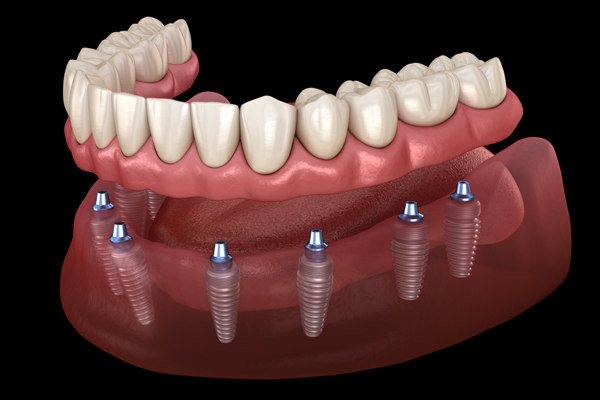Frequently Asked Questions About Dental Implants

What are dental implants?
Dental implants are the standard treatment procedure for teeth replacement. Implants fuse with the bone to support dentures and crowns. They are small posts made of titanium to substitute the roots of a lost tooth. The dentist performs a minor surgery of inserting the dental implants into the jawbone. After adding the implant into the jawbone, the dentist then fixes a very realistic porcelain tooth crown.
In some instances, the implant has to form entirely with the bone for some months before the crown is fixed permanently. In other situations, you may get new crowns, albeit temporary on the same day you have your implants set.
How many teeth can be replaced with dental implants?
There is no limit to the number of teeth that you can substitute with implants – one, two, or all of your teeth. You don’t require single implants for each missing tooth. Just two implants can sustain a detachable lower denture. With at least four implants, you can provide sufficient support for your entire upper or lower teeth.
Is a dental implant procedure painful?
This is a common worry for people who are considering a dental implant. If the procedure is performed by an expert dentist, it is uncomplicated and straightforward. The operational aspect of the process should only take about 10 to 15 minutes. In some complicated cases, however, it could take longer.
Before the process, the dentist may place you under anesthetic. The anesthetic injection may sting a bit, but it will render you numb throughout the process so you won’t feel any pain. After the operation, the dentist may recommend anti-inflammatory drugs or pain relievers for any possible ache that you may experience.
How expensive are Dental Implants
In the beginning, dental implants are costlier than other tooth-replacement procedures like bridgework or dentures. However, they are far more durable and should never even require replacement. They are the best, and most cost-effective choice considering the lifetime investment for your comfort and health.
How do I care for dental implants?
Dental implants need the same treatment you give your natural teeth. You need to make regular dental checkups, brush and floss daily. While tooth implants are not susceptible to decay, the gum tissues surrounding them could get irritated or infected for lack of good oral hygiene.
What if my body rejects the implant?
No. It is impossible for your body to reject the implant since there are no genetic materials or living cells in them. The titanium component is biocompatible, and cases of allergies are sporadic. In some cases, the implant may not fuse fully with the jawbone if an infection is present or if it is exposed to pressure or force prematurely. Regardless, the success rate is 95%.
Do I need Dental Implants?
If you need dental implants, a dentist will be able to tell you after a comprehensive oral examination, which may include x-rays of the jaw. You can book an appointment with the dentist to be sure if you require dental implants.
Request a dental appointment here: https://www.sexton-dental.com or call Sexton Dental at (740) 363-2080 for an appointment in our Delaware dental office.
Recent Posts
Dental implants can potentially survive a lifetime of use; however, the implant crowns used for chewing and biting are vulnerable to the same factors that can damage natural teeth. Therefore, it is important to take proper precautions to extend the crown's lifespan.The following are tips to add more years to an implant crown and reduce…
While dental implant placement is one of the most effective ways to replace missing teeth, there are some scenarios in which these implants cannot be placed. Because dental implant placement requires surgery, there are a few general contraindications that may interfere with the procedure itself. When considering all of the tooth replacement options, it is important…
Dental implants are increasingly becoming the go-to option for replacing a lost tooth or teeth for the right patients. Anyone can lose a tooth, whether it’s due to blunt force injury, disease, or gradual tooth decay over time. If you haven’t lost a tooth (and you aren’t a dentist), you may not even know what a…
Tooth expulsion is not something anyone wants to go through, but thankfully, a dental implant can help with this. Often times, a tooth expulsion occurs due to a traumatic injury to the face or head. With the help of a dental implant, a tooth expulsion can easily be taken care of. Dental implants are one of…


